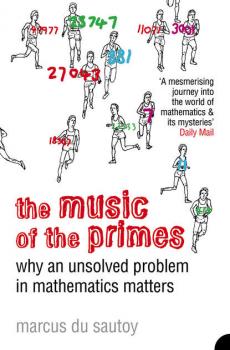ТОП просматриваемых книг сайта:















Marcus Sautoy du
Список книг автора Marcus Sautoy duАннотация
As a species, we have an extraordinary ability to create works of art that elevate, expand and transform what it means to be human. The novels of Henry James can communicate the inner world of one human being to another. The music of Wagner or Schubert takes us on an emotional rollercoaster ride as we give ourselves up to their sublime sounds.These are the expressions of what Marcus du Sautoy calls ‘the creativity code’. Yet some believe that the new developments in AI and machine learning are so sophisticated that they can learn what it means to be human – that they can crack the code.• Technology has always allowed us to extend our understanding of being human. But will the new tools of AI allow to us to create in different ways?• Could recent developments in AI and machine learning also mean that it is no longer just human beings who can create art?• And creativity, like consciousness, is one of those words that is hard to pin down: what is it that we are challenging these machines to do?In The Creativity Code, Marcus du Sautoy examines what these new developments might mean, for both the creative arts and his own subject, mathematics. From the Turing test to AlphaGo, are there limits to what algorithms can achieve, or might they be able to perfectly mimic human creativity? And what’s more, could they help Marcus to see more deeply into the complex mathematical problems with which he so often wrestles?
Аннотация
(This ebook contains a limited number of illustrations.)The ebook of the critically-acclaimed popular science book by a writer who is fast becoming a celebrity mathematician.Prime numbers are the very atoms of arithmetic. They also embody one of the most tantalising enigmas in the pursuit of human knowledge. How can one predict when the next prime number will occur? Is there a formula which could generate primes? These apparently simple questions have confounded mathematicians ever since the Ancient Greeks.In 1859, the brilliant German mathematician Bernard Riemann put forward an idea which finally seemed to reveal a magical harmony at work in the numerical landscape. The promise that these eternal, unchanging numbers would finally reveal their secret thrilled mathematicians around the world. Yet Riemann, a hypochondriac and a troubled perfectionist, never publicly provided a proof for his hypothesis and his housekeeper burnt all his personal papers on his death.Whoever cracks Riemann's hypothesis will go down in history, for it has implications far beyond mathematics. In business, it is the lynchpin for security and e-commerce. In science, it has critical ramifications in Quantum Mechanics, Chaos Theory, and the future of computing. Pioneers in each of these fields are racing to crack the code and a prize of $1 million has been offered to the winner. As yet, it remains unsolved.In this breathtaking book, mathematician Marcus du Sautoy tells the story of the eccentric and brilliant men who have struggled to solve one of the biggest mysteries in science. It is a story of strange journeys, last-minute escapes from death and the unquenchable thirst for knowledge. Above all, it is a moving and awe-inspiring evocation of the mathematician's world and the beauties and mysteries it contains.
Аннотация
‘Brilliant and fascinating. No one is better at making the recondite accessible and exciting’ Bill BrysonBritain’s most famous mathematician takes us to the edge of knowledge to show us what we cannot know.Is the universe infinite?Do we know what happened before the Big Bang?Where is human consciousness located in the brain?And are there more undiscovered particles out there, beyond the Higgs boson?In the modern world, science is king: weekly headlines proclaim the latest scientific breakthroughs and numerous mathematical problems, once indecipherable, have now been solved. But are there limits to what we can discover about our physical universe?In this very personal journey to the edges of knowledge, Marcus du Sautoy investigates how leading experts in fields from quantum physics and cosmology, to sensory perception and neuroscience, have articulated the current lie of the land. In doing so, he travels to the very boundaries of understanding, questioning contradictory stories and consulting cutting edge data.Is it possible that we will one day know everything? Or are there fields of research that will always lie beyond the bounds of human comprehension? And if so, how do we cope with living in a universe where there are things that will forever transcend our understanding?In What We Cannot Know, Marcus du Sautoy leads us on a thought-provoking expedition to the furthest reaches of modern science. Prepare to be taken to the edge of knowledge to find out if there’s anything we truly cannot know.




